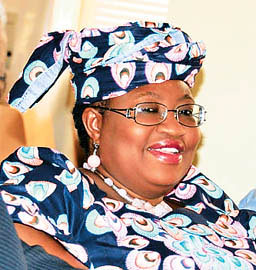
Dr. Ngozi Okonjo-Iweala, former Managing Director of the World Bank, is the Finance Minister for the Federal Republic of Nigeria, has drawn attention to the national debt in Africa's largest populated state., a photo by Pan-African News Wire File Photos on Flickr.
A nation of tragi-comedies
December 16, 2012
by EMMANUEL ONWUBIKO
Nigerian Punch
“There are crimes of passion and crimes of logic. The line that divides them is not clear. But the penal code distinguishes between them by the useful concept of premeditation. We are living in the era of premeditation and perfect crimes. Our criminals are no longer those helpless children who pleaded love as their excuse. On the contrary, they are adults, and they have perfect alibi – philosophy – which can be used for anything, even for transforming murderers into judges”
— Albert Camus (1913-1960).
The afore-quoted philosopher seemed to have the present day Nigeria in mind while writing the book entitled, “The Rebel,” in which he stated with regret that, “…On the day when crime puts on the apparel of innocence, through a curious reversal peculiar to our age, it is innocence that is called on to justify itself…”
So far, there have been instances of political and economic development in the polity that calls to question the integrity, credibility and commitment of those who preside over our affairs as a nation, and whose activities have nearly brought the nation to the precipice.
A few years ago, the Obasanjo administration claimed to have paid our national debt – an act that reportedly fetched Nigeria a big relief, what with the $12bn we reportedly paid instead of the over $35bn or so foreign debts that had accumulated over the decades.
However, less than six years after that – precisely on December 6, 2012 – the nation was told that the Federal Government had completed plans with the 36 state governments to approach some creditor agencies and nations such as China, International Monetary Fund and the World Bank for a foreign loan of over $9bn repayable in 40 years. The loan is ostensibly meant to finance the construction of some infrastructure and to also facilitate mass housing projects. The Minister of Finance, Dr. Ngozi Okonjo-Iweala, who briefed the Senate on the desirability of this huge foreign loan, sounded as if it was being done to satisfy the greatest happiness of the greatest number of Nigerians.
This is a tragic-comedy, because the truth is that Nigeria is now being gradually enslaved by another foreign debt trap similar to the one we had exited from. My only problem here is, why is Okonjo-Iweala, a world-acclaimed economist, the one negotiating another round of debts on the nation’s behalf?
Only recently, Okonjo-Iweala asked the National Assembly to approve a Federal Government’s external borrowing plan of N1.8trn, which is being sought from array of sources, including the World Bank, Africa Development Bank, Islamic Development Bank, and Exim Bank of China, among others. Okonjo-Iweala said the loans were needed for the completion of some ongoing projects captured in the year 2012 budget.
This line of reasoning is incongrous; otherwise, the Federal Government should tell Nigerians why it used scarce resources to finance the last line of foreign debts, which were dubiously obtained; only to return a few years afterwards to seek another huge loan. Where is the huge revenue that accrued to Nigeria from the crude oil exports in the last 12 months? Has it been mismanaged, as usual?
Again, some states that are scheduled to benefit from the loans are also ones whose governors behave like emperors and use public funds to finance their profligate lifestyle.
Recently, a governor was in the news for spending $30m on a chopper jet. This is a state where basic infrastructure is lacking in the rural areas, while the state capital hosts more abandoned and uncompleted projects than completed ones.
At the last count, over five serving governors are said to have purchased private jets for personal use. In some states, pupils of public schools take lessons under trees, while a standing classrooms absolutely are unfit for human habitation.
Our tragic-comedy drama climaxed with the recent score card released by Transparency International, with varying degrees of international opprobrium for Nigeria. Transparency International ranked Nigeria the 35th most corrupt country in the world. The Economist released a report saying that in 2013, Nigeria will rank as the worst place for newborns, meaning that infant mortality will be at its peak due to collapse of health infrastructure across the nation.
Spokesmen of the Federal Government, tongue-in-cheek, said the TI’s rating was a ‘wake-up call.’ Really? Do we need a foreign NGO to tell us what we all know about our nation?
Over the years, public funds have disappeared into private pockets under controversial circumstances. The looters are well-known, but they have become more powerful than the law that brought them to office!
The finance ministry said over N400bn was stolen by thieves who presented dubious companies as fuel importers to obtain fuel import subsidy in the last 12 months.
The Economic and Financial Crimes Commission is currently prosecuting some of these subsidy thieves who are connected to some ‘powerful’ government officials. It is thus uncertain how successful the anti-graft commission will be in this onerous but unenviable exercise.
There is a general climate of fear and instability because the resources meant to develop the nation are being stolen by a few while there’s no serious effort to retrieve these funds.
With all this, it is only an insensitive government that will still go ahead and borrow money from any source to finance projects that the average Nigerian they claim to serve cannot identify with.
- Onwubiko is head, Human Rights Writers’ Association of Nigeria.
No comments:
Post a Comment